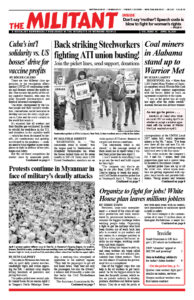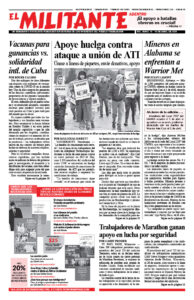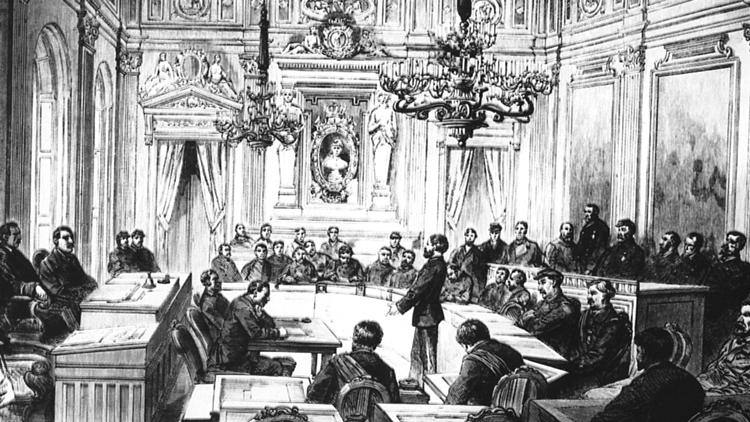This week’s special feature commemorates the 150th anniversary of the Paris Commune, the world’s first working-class government. It lasted from March 18 to May 28, 1871, before its overthrow in a bloody counterrevolution. The excerpts below are from an article, “Communism and the Fight for a Popular Revolutionary Government: 1848 to Today,” by Mary-Alice Waters, in New International no. 3. Waters is a leader of the Socialist Workers Party and an editor of New International, a journal of Marxist politics and theory. Copyright © 1984 by New International. Reprinted by permission.
BY MARY-ALICE WATERS
The revolutionary upsurge of 1871 that led to the Paris Commune was precipitated by the defeat of the French armies in the Franco-Prussian War. “Storming heaven,” as [Karl] Marx put it, the working people of Paris seized power, drove the government of the French bourgeoisie out of the city, and held the advancing Prussian army at bay.
“The political rule of the producers” was established, said Marx. “The proletariat for the first time held political power.” The Paris Commune, “the glorious harbinger of a new society,” showed the way forward for all humanity. …
What was Marx’s conclusion? The secret of the Commune, as he put it in The Civil War in France, was that “it was essentially a working-class government.”
By this Marx did not mean that the Commune was a minority government of Paris, a city that still had only a small industrial work force. Marx said that the Commune was a “government of the people by the people,” a government of the producers. It was a government that led the nation.
The economic and social trajectory of this revolutionary dictatorship was clear. The Commune, Marx said, was “the political form at last discovered under which to work out the economic emancipation of labour.” It was a tool for organizing and leading the transition from the society it inherited to a new order. The Commune, he emphasized, was “a lever for uprooting the economical foundations upon which rests the existence of classes, and therefore of class-rule.” That was not a task to be accomplished overnight. The Commune, however, showed the political form that would enable the exploited producers to organize to wrest from the exploiters, by degrees, the productive property rightfully theirs.
Marx carefully studied the actions of this first government of the producers, including those that pointed to its chief weaknesses.
“The first decree of the Commune,” Marx noted, “was the suppression of the standing army, and the substitution for it of the armed people.” With that act — the precondition for a real people’s revolution — a new government began to function, a revolutionary dictatorship whose legitimacy was based on the armed might of the popular majority. …
The armed people inside Paris, organized and led by the Central Committee of the National Guard, began to assume all public functions. Through the institutions of the newly elected municipal government, the Paris Commune, the masses of working people were drawn into the tasks of deciding all questions affecting their daily lives — food distribution, education, health, public order and defense — and then implementing these decisions.
The Paris Commune was “no longer a state in the proper sense of the word,” [Frederick] Engels wrote in 1875. It was no longer an instrument for suppressing the majority, which had been the function of the state throughout all prior history. In place of a special coercive force, the armed population itself was organized through the Commune government and became the guarantor of popular majority rule. …
The Paris Commune showed for the first time how a qualitatively new kind of political power begins to emerge as soon as the minority — the old ruling classes — no longer exercise a dictatorship suppressing the majority — the exploited classes.
It was still necessary, however, to suppress the armed resistance of the minority — the French bourgeoisie and landed property owners. Most of these exploiters fled Paris for nearby Versailles when the Commune took power. They continued to collaborate with the Prussian army, which was at the gates of Paris. As always, the old ruling classes, though shocked and stunned by the revolutionary victory of the people, were determined to restore their rule at any price.
It was in part what Marx called the “too great decency” of the Paris working people, their reluctance to use decisive military force against their class enemies, that led to the Commune’s early defeat after seventy-two days of tumultuous existence. The counterrevolutionary forces showed no such decency. They carried out one of the bloodiest slaughters ever inflicted on a city. The victorious forces of reaction ruthlessly murdered some 20,000 men, women, and children. …
While Marx and Engels considered the heroic uprising of the Parisian workers to have been the greatest revolutionary action by any section of the international proletariat up until that time, they were by no means uncritical of the Commune’s leadership or its policies. The Commune reinforced every lesson previously drawn concerning the need for an organized vanguard party of the proletariat, based on a scientific — not a utopian, petty-bourgeois — program. …
It is worth noting that among the many descriptions used by Marx to capture various aspects of the Paris Commune’s significance, he nowhere described it as the dictatorship of the proletariat. Engels did describe it in these terms on one occasion twenty years later — in the final sentences of his introduction to the 1891 edition of The Civil War in France. He derisively pointed to the hypocrisy and spinelessness of those on the right wing of the German Social Democratic Party who feigned reverence for the Commune, but were “filled with wholesome terror at the words: Dictatorship of the Proletariat. Well and good, gentlemen,” Engels rebuked them, “do you want to know what this dictatorship looks like? Look at the Paris Commune.”
As history has demonstrated, however, the revolutionary dictatorship established by the Commune was, more accurately, a transitional, revolutionary government of the producers — the first anticipation of what we today call a workers and farmers government. As such, it illuminated, briefly but brilliantly, the future not just for France and Europe, but for the world.


